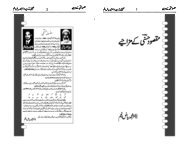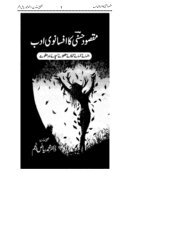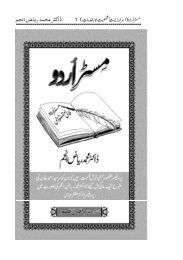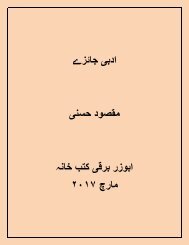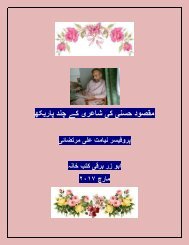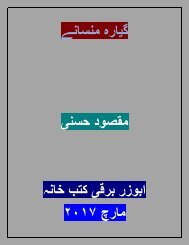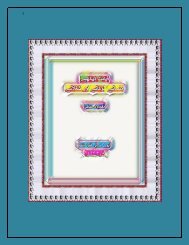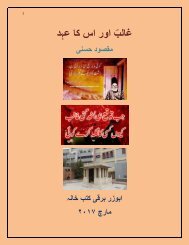Japani_ki_lisaniyati_Nazam_or_bhol_chal
You also want an ePaper? Increase the reach of your titles
YUMPU automatically turns print PDFs into web optimized ePapers that Google loves.
JPANI KA LASANIYATI NAZAAM AUR<br />
BOOL CHAL By Maqssoq Hasni<br />
138<br />
Compiled By: Dr. M. Riaz Anjum<br />
how much is it?<br />
Shimita: Ni hyaku go ju en desu.<br />
Es kay 250 yen hoon ga.<br />
It’s two-hundred fifty yen.<br />
Kazi: Hai, go hyaku en desu.<br />
Qazi: Yah rahay aap kay 250 yen.<br />
Qazi: Here you are, five-hundred yen.<br />
Shimita: Ni hyaku go ju en no o tsuri desu, arigata gozai<br />
mashita<br />
Shimita: Array, 250 yen ka khula, bohat bohat shukarreya.<br />
Shimita: Wo-hundred fifty yen change, thank you very<br />
much.<br />
(1) Konnichi wa. Hajimemashite.<br />
Hello. Nice to meet you.<br />
Hajimemashite. O-gen<strong>ki</strong> desu ka?<br />
Nice to meet you.<br />
How are you?<br />
Hai, gen<strong>ki</strong> desu.<br />
I am fine.<br />
Watashi wa kazi to moushimasu. Anata no o-namae wa?<br />
My name is Qazi. What is your name?<br />
Watashi wa kazi to iimasu. Y<strong>or</strong>oshiku o-negai shimasu.<br />
My name is Qazi. Pleased to make your acquaintance.<br />
Y<strong>or</strong>oshiku o-negai shimasu.<br />
Pleased to make your acquaintance.<br />
Hajimemashite literally means "it is a beginning" but would<br />
be the equivalent of "Nice to meet you" in English. It would<br />
only be used the first time meeting someone gen<strong>ki</strong> means<br />
"in good spirits".<br />
"O-gen<strong>ki</strong> desu ka" is literally as<strong>ki</strong>ng "Are you in good<br />
spirits?".<br />
This is the most common way of as<strong>ki</strong>ng "How are you?" in<br />
Japanese.<br />
The other person responds "Yes, I am in good spirits".<br />
Mousu is the ultra polite f<strong>or</strong>m of the verb "iu" (to say). Both<br />
people are literally saying "I am said/called _____".<br />
69<br />
JPANI KA LASANIYATI NAZAAM AUR<br />
BOOL CHAL By Maqssoq Hasni<br />
137<br />
Think kangae kangae ru kangae te kangae masu<br />
Change kae kae ru kaete te kae masu<br />
Bring together atsume astume ru atsume te atsume masu<br />
Doo Moqalmay<br />
Compiled By: Dr. M. Riaz Anjum<br />
(1) Kazi-san: Mise e iku ka. Are you going to the st<strong>or</strong>e?<br />
<strong>ki</strong>ya aap st<strong>or</strong>e <strong>ki</strong> janib<br />
ja rahay hain?<br />
Shamita-san: Hai, iku. Yes, I am going there. haan mein<br />
wahaan<br />
(hi) ja raha hoon.<br />
Lughat<br />
Mise e iku literally translates, to the st<strong>or</strong>e; (I) go St<strong>or</strong>e <strong>ki</strong><br />
janib (mein) jata<br />
192<br />
Mise e iku lafzi tarjama, st<strong>or</strong>e <strong>ki</strong> janib, (maira) Jana<br />
Mise st<strong>or</strong>e e wa ka matlab "<strong>ki</strong> janib" yaeni "to"<br />
Iku to go jana/jata<br />
Ka sawaliya jumlay kay hawala say estamal main laya giya<br />
hai<br />
Hai. Yes Haan<br />
(2) Kazi: Sumimasen, nani ka atatakai nomi mono o<br />
kudasai.<br />
Qazi: Moaf <strong>ki</strong>jiay ga (moaf karma), <strong>ki</strong>ya mujhy kuch garam<br />
(cha’ay waghera) pinay ko<br />
mil sakta hai?<br />
Qazi: Excuse me, could I have something hot to drink?<br />
Shimita: kohi, kocha, ocha ga arimasu?<br />
Shimita: Hamaray pas kafi, Angraizi cha’ay aur japani<br />
cha’ay hai,<br />
Shimita: we have coffee, English tea and Japanese tea.<br />
Kazi: Ocha o kudasai, ikura desu ka?<br />
Qazi: Mein eak kap japani ch’ay pina chahoon ga,<br />
es kay <strong>ki</strong>ya daam hon ga?<br />
Qazi: I would like a cup of Japanese tea,




